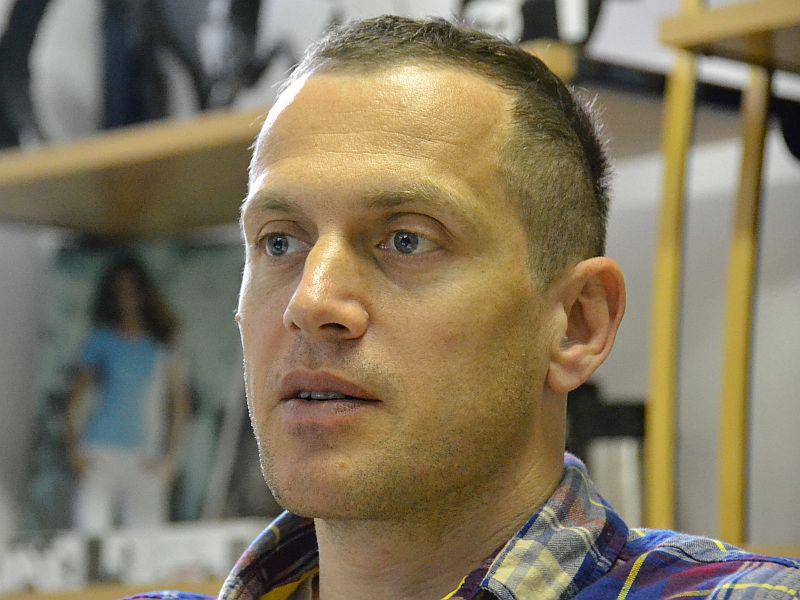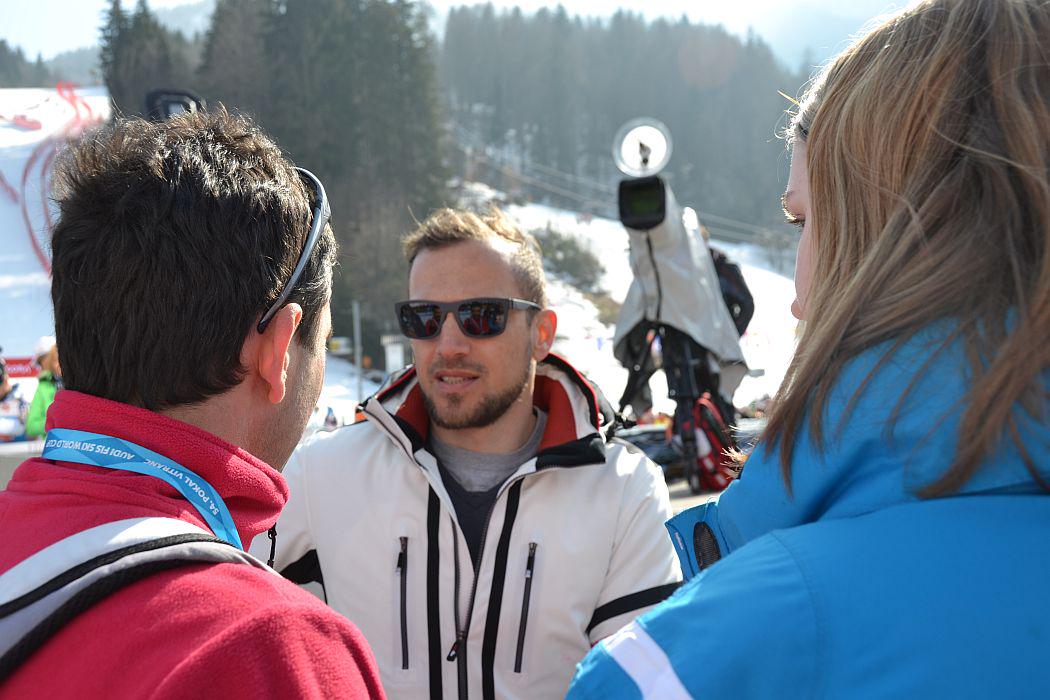

He was the world youth champion in Super-G, but was most successful in technical disciplines. After he finished his career as a top sportsman, he continued with successful business ventures, mostly connected to sports. A sportsman, a businessman, an advocate of an active and healthy lifestyle, a husband and father of three children.
On my way to the interview, I was reliving the feelings when we were watching you compete, how we were cheering on our skiers and what a positive effect your successes had on national awareness. I remembered the 1993/1994 season, when you won your first World Cup race, which was the first victory for our then very young country. Those were really exceptional times.
That’s true. I think that really coincided with our independence and the pride we all felt at the time. We were more emotionally involved in everything that was happening. We wanted to introduce Slovenia to the world. That wasn’t just in skiing. There was also great enthusiasm and cheering in other sports on the occasion of more significant results. So much time has passed since then. The array of different top sports results has widened so much. We have many top sportspeople who also compete abroad, such as Anže Kopitar, Goran Dragić and others. Perhaps we’re not so keen anymore and there is less enthusiasm. I’m very happy to have experienced that period. The atmosphere was fantastic; many fans were present at competitions.
And then came the Olympic Games in Lillehammer and the first medals in skiing for Slovenia (Jure Košir won bronze in slalom). Those were exceptional Games.
They really were. But perhaps Albertville in 1992, when Slovenia took part in the Winter Olympics for the first time, was even more special for us. We didn’t know until the last moment whether we would be able to participate as Team Slovenia. We were such a small team, but extremely proud when we walked behind the Slovenian flag carried by ski jumper Franci Petek at the opening ceremony. I was 18 years old and I savoured that moment. Of course, Lillehammer was also wonderful because of the medals we won. It was only after we returned home that I realised the reaction these medals had triggered when ten thousand people gathered at a spontaneous reception. That was a huge surprise for all of us. In moments like that, you realise how much these things mean to people.
Skiing for many years was our national sport, the number one sport. Is it still the same?
No, I don’t think skiing is the number one sport, and I don’t think about which sport could be number one. If you look globally, it’s definitely football. Although in skiing everything more or less relies on the really exceptional Tina Maze, it is still nevertheless an important part of our history, of Slovenian heritage. For the last 50 years, I can say that Slovenians have liked this sport very much. And I’m not talking only about following results and cheering, but also recreation on snow. Many Slovenians still ski. And when there’s snow, they still go on ski trips in large numbers, which means that it’s a part of the Slovenian culture. Even if there aren’t any top results – the cheering part will somewhat die away, of course – but skiing will still continue as a recreational sport.
During your career, you also made many friends among your rivals. When you ended your sports career, many familiar skiing faces participated at the events you organised in Kranjska Gora. Do you still keep in touch?
I have to say that I was extremely surprised and honoured when everyone who was invited to the event actually came. Although I never competed against him, even Ingemar Stenmark turned up. And of course, Alberto Tomba and everyone from our golden generation. That was probably one of the greatest awards in my career – to be able to make contacts and friends in spite of the fact that we were rivals when it came to competing. Perhaps it was my ability to approach people in a somewhat different way and make friends. I’m really proud of these ties and friendships. We became and remained really good and close friends with some of them. We keep in touch and also organise certain joint projects.
When you ended your sports career, you were involved in sports through your business.
That’s true. Already during my sports career, I was thinking about what I would be doing after I retired from sport. I said to myself that I had to start doing something immediately because I couldn’t be inactive. I made a plan with my long-term agent about how to go into business. So I immediately started doing sports marketing, the organisation of sporting events, representation of sportspeople and later the sale of sports and fashion equipment. At that time, I thought I would have more free time than I had as an active sportsman, but I was quite wrong. (laugh) Perhaps I’m trying to do too many things at once and I am always running out of time. But I’m not sorry about that; I’ve learned a lot over the years about business and life. It has to be said that as a top sportsperson, you live completely different from ordinary people. The transition is quite challenging. I knew I wanted to do something that is connected to sports, and I think I went in the right direction.
Which projects do you mean?
We organise various sponsorships, particularly in ice hockey and Alpine skiing. We’ve also organised sporting events, like the Ski Legends Hit Challenge in Kranjska Gora and at the anniversary of the Winter Olympics in Sarajevo, and ice-hockey events; we also organised an ice-hockey match in the Pula Arena in Croatia. We represent sportspeople, which means dealing with the whole business side of sports. We deal a lot with ice-hockey and have been cooperating with Medveščak Ice Hockey Club from Zagreb for several years, whose approach was updated, and which took the club into the expanded Austrian EBEL league. In the last two years, the club has been in the Continental Hockey League, which is the expanded Russian league, and that was really a big project. It was an interesting process which received a vast response. When we started, we didn’t imagine that we’d be so successful. We have a broad base of supporters, matches are well-attended, and the numbers are really exceptional. Prior to that, we worked with Jesenice Ice Hockey Club, which had just joined the EBEL league at the time. I’d like to see more successful stories with the same response from the fans.
You’re also involved in charity work.
This has a long history, and I don’t want to emphasise the things I’ve done. I am socially conscious and I try to do something for the benefit of society. It started when I donated my prize money for the win in Kranjska Gora in 1995 to the Bosnian skiing team so they could afford training and equipment. I later received an official recognition from Bosnia and Herzegovina for that. I did that completely spontaneously, and I am not sorry, because they were able to train in Italy and compete in spite of the difficult situation in their country. I want to organise a charity event every year. In spring, with some friends I’m organising a charity family run called Formaraton, which is intended for all, and everyone can run the distance they want. This year, it’ll be the seventh. This really makes me happy, because anyone can help in their own way. I’ve noticed that Slovenians are much more aware of the importance of solidarity than in the past. I certainly consider myself a socially conscious member of this society. Our good deeds can make a difference. With willingness and energy, we can help many people and we don’t need a lot of money for that.
Polona Prešeren, SINFO

































































